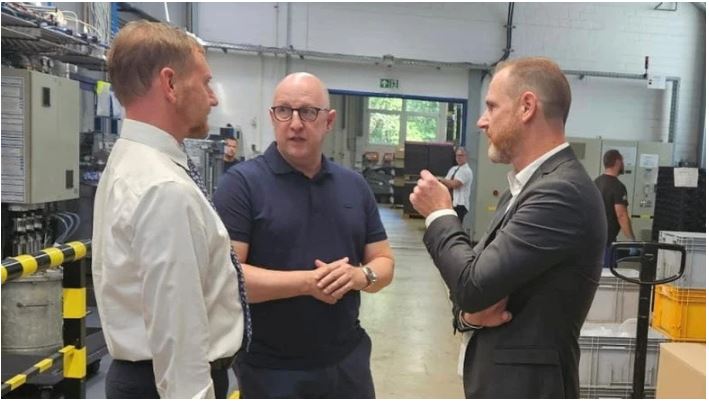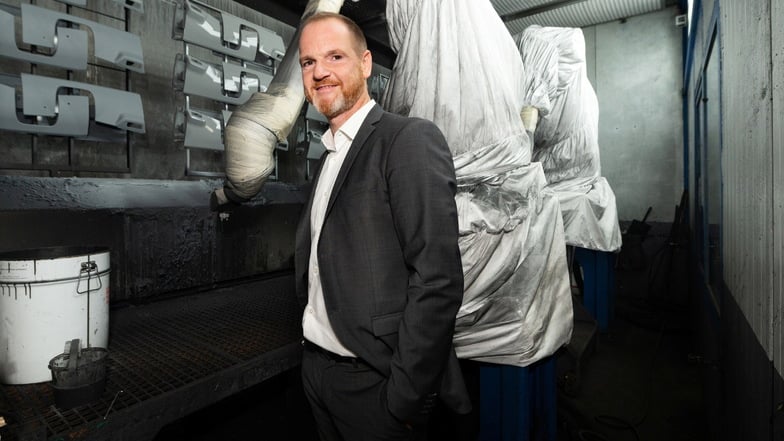By Siri Rokosch
Ottendorf-Okrilla. Andreas von Feilitzsch is managing director and one of the three owners of the Ottendorf company JKL Plastics Painting Ltd. in the industrial park. The medium-sized company has been in existence since 1999, and he has been managing it since 2020 - the Corona year that brought many industries into distress.
The crises, such as Corona, the chip and semiconductor shortages, the war in Ukraine, and high inflation, have caused a sharp drop in production and sales in the automotive sector and led to rising production costs and problems along the supply chains, he tells Sächsische.de. Prices have not been able to be adjusted to the necessary extent with customers, as the increased costs with falling unit numbers would have required, he explains.
According to his own statements, the entrepreneur filed for insolvency at an early stage in order to be able to fundamentally restructure the business. For this reason, he and Ottendorf Mayor Rico Pfeiffer (non-partisan) Saxony's Minister President Michael Kretschmer (CDU) was invited so that he could get a picture on site.
In addition, a dialog about the concerns of medium-sized companies was sought, because Andreas von Feilitzsch says: "It's not just us, but many medium-sized companies in Germany."

Ottendorfer JKL paints vehicle parts for VW, Audi and Porsche
70 employees currently work in two shifts every day. Before Corona, there were 120, who paint plastic interior parts for the automotive industry in a three-shift system on the fully automated robotic painting systems. These parts are then installed in vehicles mainly from VW, Audi and Porsche. However, the products are supplied to subcontractors, explains the managing director.
"We paint surfaces of automotive interiors, such as door handle panels, speaker grilles and trim." But the main sales market has been slumping for three years, von Feilitzsch notes: "Automotive production in Germany is only about 60 to 65 percent of pre-crisis levels."
Price explosions shake up Ottendorf company
As a result of this decline, the order situation for his company had also decreased, as was the case in many companies in the industry. In addition, the costs for coatings and chemicals have risen by around 30 percent, and energy costs have doubled.
The increase in the minimum wage has led to further increases in costs, says von Feilitzsch: "We have always paid above the minimum wage, but the increase in the minimum wage has caused the overall wage level to rise significantly. On the one hand, people need the money, and I would like to pay significantly more, but on the other hand, this also leads to higher production costs. That doesn't work out well in the long run if the necessary prices can't be pushed through to customers."
Why did the company have to go bankrupt?
In February 2023, the company had filed for insolvency. Andreas von Feilitzsch had decided this mainly because he was unable to pass on his increased costs to his customers and was thus faced with a continuing loss situation.
"We were not over-indebted and we were not insolvent," von Feilitzsch says. "All employees have always received their salaries on time and will continue to do so in the future."
"The intended goal, that with the help of the procedure the customers finally accept the necessary prices, could be achieved, so that the company can operate profitably again," says the JKL managing director.
"Now we are in the process of working out a sustainable solution with the creditors. We have a very good cooperation with the insolvency administrator and the insolvency court, the forecast is positive and we are confident for the future of JKL."
Saxony's Minister President at Ottendorf company
On August 18, Andreas von Feilitzsch had a visit from the Prime Minister of Saxony, Michael Kretschmer (CDU). "The high energy costs, the continuing high inflation, labor shortages despite immigration and the accompanying decline in Germany's competitiveness as a business location came up," he says.
The energy turnaround and its consequences for entrepreneurs like him were also addressed, according to von Feilitzsch: "Our savings options are exhausted. Above all, we need gas for the technically specified heating processes, to which we have to strictly adhere. We can't simply switch to other energy sources. We don't even have the possibility to implement this so quickly," he says and emphasizes: "The statics don't allow a photovoltaic system on the roof. In addition, the hall roof would only be able to cover about 10 percent of our needs."
Kretschmer takes problems of the Ottendorfer "with to Berlin
He fears, as do many others, that the German industrial location could migrate in the long term. He has already lost two orders abroad to the Czech Republic and Romania without the insolvency. The entrepreneur asked the prime minister to "take the problems with him to Berlin", that framework conditions must be created in order to be able to exist in international competition.
"The prime minister assured that he would continue to take the concerns of small and medium-sized enterprises seriously and that he would advocate close cooperation between politics, business and local authorities in order to jointly meet the challenges of the day," the managing director recalls of the conversation.








